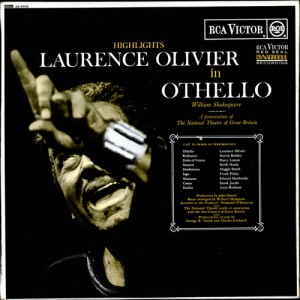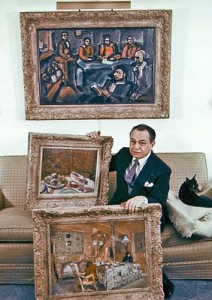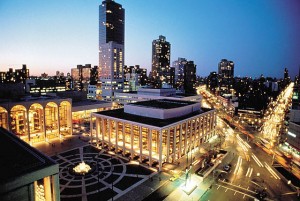And what color should he be? That’s the subject, more or less, of my “Sightings” column in today’s Wall Street Journal. Here’s an excerpt.
* * *
In this country, Steven Berkoff is mostly known (if at all) as the villain in “Beverly Hills Cop.” In his native England, by contrast, he is known as an avant-garde theater artist who likes to say outrageous things. It was in the latter capacity that he recently went after a London drama critic, Paul Taylor of the Independent, who was covering the Royal Shakespeare Company’s new production of “Othello,” in which the title role, as is now the invariable custom, was played by a black actor, Hugh Quarshie. “The days when it was thought acceptable for a white actor to black up as Othello are well behind us,” Mr. Taylor wrote. Mr. Berkoff responded angrily on his Facebook page by recalling Laurence Olivier’s performance in “Othello”: “I was so lucky I was able to witness this great event before the fiends of political correctness in all their self-righteousness had struck a no-go-zone for white actors on that particular role.”
 Anyone who’s seen Olivier’s Othello, which was filmed in 1965, knows that it was, indeed, a supremely great event. But anyone who follows the theater scene knows that such an event will never happen again, at least not in my lifetime. Today we take it for granted that Othello, one of the only two major Shakespearean characters who is specifically described by the playwright as black, should be played by a black actor. It’s considered inappropriate, even racist, for a white actor to put on blackface, as Olivier did 50 years ago, to play Othello.
Anyone who’s seen Olivier’s Othello, which was filmed in 1965, knows that it was, indeed, a supremely great event. But anyone who follows the theater scene knows that such an event will never happen again, at least not in my lifetime. Today we take it for granted that Othello, one of the only two major Shakespearean characters who is specifically described by the playwright as black, should be played by a black actor. It’s considered inappropriate, even racist, for a white actor to put on blackface, as Olivier did 50 years ago, to play Othello.
And should that be so? Well…it’s complicated.
Nowadays virtually all theater companies are committed, some more zealously than others, to what’s known as “non-traditional casting,” which is very often employed without regard for strict dramatic or visual logic….
So why not a white Othello? Wouldn’t that qualify as non-traditional these days? The answer is obvious: The door of non-traditional casting swings one way. It is normally intended to benefit minorities, not whites, who have no history of being excluded from stage roles because of their skin color. To be sure, I can easily imagine an “Othello” in which all of the characters but Othello were black, and I expect that would pass political muster. Nothing less, however, would be deemed acceptable today…
Is that logical? I suppose not. But America, as the multifarious complexities of the Rachel Dolezal imbroglio remind us, has never been very logical when it comes to matters of race….
* * *
Read the whole thing here.
An excerpt from the 1965 film of Othello, directed by Stuart Burge, with Laurence Olivier in the title role and Maggie Smith as Desdemona. The film is closely based on John Dexter’s 1964 National Theatre staging of the play:


 I’ve been reading All My Yesterdays, Edward G. Robinson’s posthumously published 1973 autobiography. Contrary to his celebrated tough-guy screen persona, Robinson was an exceedingly literate and cultivated man, a regular concertgoer and one of golden-age Hollywood’s leading art collectors. He was also a very liberal Democrat who, though never a Communist, was far enough to the left to make it into the pages of
I’ve been reading All My Yesterdays, Edward G. Robinson’s posthumously published 1973 autobiography. Contrary to his celebrated tough-guy screen persona, Robinson was an exceedingly literate and cultivated man, a regular concertgoer and one of golden-age Hollywood’s leading art collectors. He was also a very liberal Democrat who, though never a Communist, was far enough to the left to make it into the pages of 
 In recent years, though, Lincoln Center has weathered an equally unprecedented series of crises. The New York City Opera stopped performing there in 2011 and closed its doors two years later. Shortly thereafter, the Metropolitan Opera was forced to contend with a fiscal meltdown that threatens its very survival. Meanwhile, the New York Philharmonic, whose concert hall is closing in 2019 for desperately needed interior renovations, announced that Alan Gilbert, its music director, will be stepping down from that post in 2017 after a tenure widely regarded as lackluster….
In recent years, though, Lincoln Center has weathered an equally unprecedented series of crises. The New York City Opera stopped performing there in 2011 and closed its doors two years later. Shortly thereafter, the Metropolitan Opera was forced to contend with a fiscal meltdown that threatens its very survival. Meanwhile, the New York Philharmonic, whose concert hall is closing in 2019 for desperately needed interior renovations, announced that Alan Gilbert, its music director, will be stepping down from that post in 2017 after a tenure widely regarded as lackluster…. IN GARRISON, N.Y.:
IN GARRISON, N.Y.: